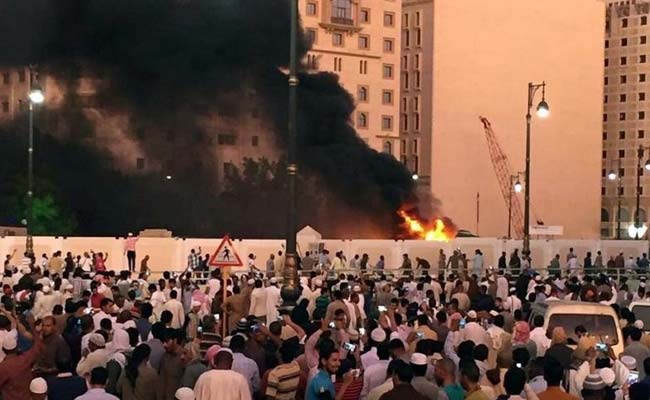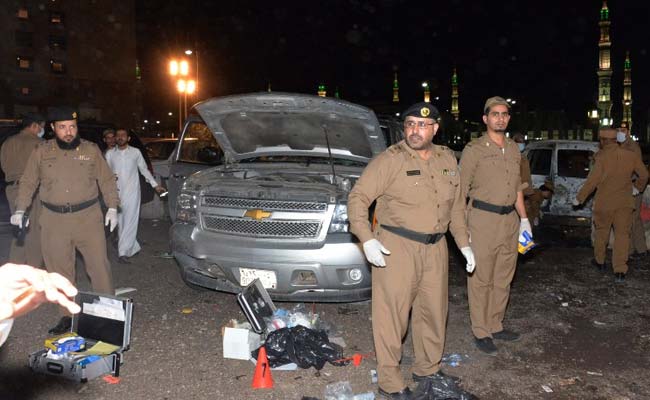
A suicide bomber detonated a bomb near the security headquarters of the Prophet's Mosque in Medina, the second-holiest site in Islam.
Beirut:
Suicide bombers suspected of links to the Islamic State struck for the fourth time in less than a week on Monday, targeting three locations in Saudi Arabia in an extension of what appeared to be a coordinated campaign of worldwide bombings coinciding with the Muslim holy month of Ramadan.
Initial reports suggested there were relatively few casualties in the attacks at a U.S. consulate, a mosque frequented by Shiite worshippers and a security center in one of Islam's holiest sites, the historic city of Medina. Security officials told news agencies that two security guards died in the Medina attack.
The attacks nonetheless offered further evidence that in the three years since it declared the existence of its so-called caliphate, the Islamic State has developed the capacity to strike at will at the time of its choosing in diverse locations around the world.
 There was no immediate claim of responsibility, but the bombings bore the hallmarks of the Islamic State, with suicide attackers picking targets that closely coincide with the group's declared enemies - Americans, members of the Shiite Muslim minority, and the Saudi security services.
There was no immediate claim of responsibility, but the bombings bore the hallmarks of the Islamic State, with suicide attackers picking targets that closely coincide with the group's declared enemies - Americans, members of the Shiite Muslim minority, and the Saudi security services.
The militant group, as it has in each of the previous three years, had urged its followers to carry out attacks during the holy Muslim month of Ramadan, a period of fasting, abstention and prayer that will conclude on Wednesday with a holiday of feasting and family visits.
This has turned into the most blood-soaked Ramadan yet in the Islamic State's campaign. At least 290 people have been killed in attacks claimed by or linked to the Islamic State at the Ataturk Istanbul airport, a restaurant frequented by foreigners in the Bangladeshi capital Dhaka and in Baghdad. The vast majority of them - 222 people - died in the Baghdad blast, which targeted a shopping street packed with people out celebrating the end of the day's fast and shopping for the approaching holiday.
Omar Mateen, the gunman who killed 49 people at an Orlando nightclub last month, may also have been inspired by the call for Ramadan attacks issued by the Islamic State's chief spokesman, Mohammed al-Adnani, in late May. But although Mateen cited the Islamic State as his inspiration in phone calls to emergency responders, investigators have found no evidence he was directly linked to the group.
The Islamic State also did not claim the attack in Istanbul, but Turkish investigators say the group is the leading suspect.
The attacks in Saudi Arabia raised concerns that the group is taking deeper root there, potentially threatening the stability of one of America's closest Arab allies. The Islamic State has frequently threatened the kingdom, whose status as the guardian of the holiest sites in Islam is challenged by a group that regards itself as the rightful leader of the Muslim world.
 The first blast came in the afternoon outside the closely-guarded U.S. consulate in the Saudi city of Jeddah, the first of the past week's attacks directly to target a U.S. facility. Two security guards were wounded and the bomber died after security guards approached the man and he detonated his explosives, according to the state-run Saudi Press Agency.
The first blast came in the afternoon outside the closely-guarded U.S. consulate in the Saudi city of Jeddah, the first of the past week's attacks directly to target a U.S. facility. Two security guards were wounded and the bomber died after security guards approached the man and he detonated his explosives, according to the state-run Saudi Press Agency.
Hours later, a suicide bomber blew himself up near a mosque in the majority Shiite city of Qatif in eastern Saudi Arabia. A resident of the city contacted by Reuters news agency said there appeared to be no casualties other than the bomber, because worshippers had already gone home to break their fast. The Islamic State has in the past year claimed a number of deadly bombings against the Shiite minority in Saudi Arabia.
The final attack came in Medina, the second holiest site in Islam, which is visited by millions of Muslim pilgrims every year. It apparently targeted Saudi security forces stationed near the 7 th century Mosque of the Prophet Mohammed, who is buried there.
Local news media reported that two security guards died when at least one bomber detonated explosives near the mosque. There was no immediate comment by the government, but a state owned television station later broadcast footage of worshippers praying in the mosque, which was apparently unscathed.
© 2016 The Washington Post
(This story has not been edited by NDTV staff and is auto-generated from a syndicated feed.)
Initial reports suggested there were relatively few casualties in the attacks at a U.S. consulate, a mosque frequented by Shiite worshippers and a security center in one of Islam's holiest sites, the historic city of Medina. Security officials told news agencies that two security guards died in the Medina attack.
The attacks nonetheless offered further evidence that in the three years since it declared the existence of its so-called caliphate, the Islamic State has developed the capacity to strike at will at the time of its choosing in diverse locations around the world.

Muslim worshippers gather after a suicide bomber detonated a device near the security headquarters of the Prophet's Mosque in Medina, Saudi Arabia, July 4, 2016. (Reuters)
The militant group, as it has in each of the previous three years, had urged its followers to carry out attacks during the holy Muslim month of Ramadan, a period of fasting, abstention and prayer that will conclude on Wednesday with a holiday of feasting and family visits.
This has turned into the most blood-soaked Ramadan yet in the Islamic State's campaign. At least 290 people have been killed in attacks claimed by or linked to the Islamic State at the Ataturk Istanbul airport, a restaurant frequented by foreigners in the Bangladeshi capital Dhaka and in Baghdad. The vast majority of them - 222 people - died in the Baghdad blast, which targeted a shopping street packed with people out celebrating the end of the day's fast and shopping for the approaching holiday.
Omar Mateen, the gunman who killed 49 people at an Orlando nightclub last month, may also have been inspired by the call for Ramadan attacks issued by the Islamic State's chief spokesman, Mohammed al-Adnani, in late May. But although Mateen cited the Islamic State as his inspiration in phone calls to emergency responders, investigators have found no evidence he was directly linked to the group.
The Islamic State also did not claim the attack in Istanbul, but Turkish investigators say the group is the leading suspect.
The attacks in Saudi Arabia raised concerns that the group is taking deeper root there, potentially threatening the stability of one of America's closest Arab allies. The Islamic State has frequently threatened the kingdom, whose status as the guardian of the holiest sites in Islam is challenged by a group that regards itself as the rightful leader of the Muslim world.

Saudi security personel gather at the site of the suicide attack near the security headquarters of the Prophet's Mosque in Medina City on July 4, 2016. (AFP Photo)
Hours later, a suicide bomber blew himself up near a mosque in the majority Shiite city of Qatif in eastern Saudi Arabia. A resident of the city contacted by Reuters news agency said there appeared to be no casualties other than the bomber, because worshippers had already gone home to break their fast. The Islamic State has in the past year claimed a number of deadly bombings against the Shiite minority in Saudi Arabia.
The final attack came in Medina, the second holiest site in Islam, which is visited by millions of Muslim pilgrims every year. It apparently targeted Saudi security forces stationed near the 7 th century Mosque of the Prophet Mohammed, who is buried there.
Local news media reported that two security guards died when at least one bomber detonated explosives near the mosque. There was no immediate comment by the government, but a state owned television station later broadcast footage of worshippers praying in the mosque, which was apparently unscathed.
© 2016 The Washington Post
(This story has not been edited by NDTV staff and is auto-generated from a syndicated feed.)
Track Latest News Live on NDTV.com and get news updates from India and around the world

